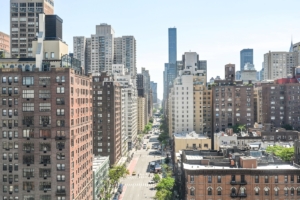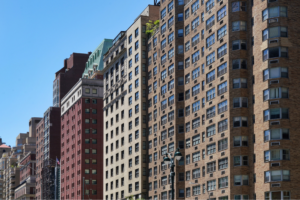Late fall brought an expected decline in the number of homes for sale across the city. Sluggish price growth persisted in Manhattan, though the borough’s least expensive submarket, Upper Manhattan, bucked the trend and remained distinctively competitive, according to the November 2017 StreetEasy® Market Reports[i].
The Manhattan median resale price remained essentially flat year-over-year at $1,166,947 in November. In Upper Manhattan, the median resale price rose significantly by comparison, up 4.2 percent year-over-year to $513,620. Median resale prices rose 3.6 percent year-over-year in Brooklyn to $758,382[ii] and 6.1 percent to $510,095 in Queens.
In a welcome sign for buyers hunting at lower price points, for-sale inventory rose substantially in the city’s least expensive areas – up 45.8 percent in South Brooklyn, 25.6 percent in Northeast Queens and 12.6 percent in Upper Manhattan since last year.
Median rents across Manhattan, Brooklyn, and Queens remained essentially flat, all growing less than 1 percent year-over-year. Median rents in Manhattan and Brooklyn rose 0.2 percent to $3,139 and $2,535, respectively[iii]. Median rent in Queens dropped 0.5 percent compared to this time last year, to $2,090. Upper Manhattan rents grew the most among Manhattan’s submarkets — up 1.2 percent year-over-year to $2,236. Rents in South Brooklyn and Northeast Queens rose 0.9 and 1.2 percent to $1,856 and $1,907, respectively.
“Impacts of the winter slow season are beginning to play out across the city as New Yorkers shift their focus from selling, buying or renting their homes to preparing for the holidays,” said StreetEasy Senior Economist Grant Long. “Now through the start of the new year, sellers are unlikely to move new inventory onto the market or offer price cuts on existing inventory until more buyers are on the market. However, price trends indicate that more affordable regions of the city, such as Upper Manhattan, Northeast Queens and South Brooklyn continue to see strong demand and are set for ongoing price growth in 2018. While volume will remain low through the holidays, we expect to see an influx of new inventory and price cuts to homes still on the market as competition picks back up in 2018.”
See below for additional sales and rental market trends across Manhattan, Brooklyn, and Queens.
[tableau server=”public.tableau.com” workbook=”priceIndices_November2017″ view=”StreetEasyPriceIndex” tabs=”no” toolbar=”no” revert=”” refresh=”yes” linktarget=”” width=”600px” height=”820px”][/tableau]
November 2017 Key Findings – Manhattan
- Resale prices in Manhattan stagnated — except in Upper Manhattan. Manhattan’s median resale price was $1,166,947 in November, essentially unchanged from this time last year. The median resale price in Upper Manhattan rose 4.2 percent to $513,620 and the median rose 2.3 percent in the Upper East Side to $1,028,462. All other Manhattan submarkets experienced price drops.
- Rents across Manhattan remained flat. Rents in Manhattan grew 0.2 percent since last year to a median of $3,139. The median asking rent in Upper Manhattan rose 1.2 percent to $2,236.
- Upper West Side homes offered the most price cuts. Manhattan’s price cuts were concentrated on the Upper West Side, where 13 percent of units had a discount – up 2.2 percent year-over-year.
November 2017 Key Findings – Brooklyn
- Resale prices rose, led by South Brooklyn. The median resale price in Brooklyn rose 3.6 percent year-over-year to $758,382. Prices in South Brooklyn, the borough’s second-least expensive submarket, rose the most, up 7.8 percent year-over-year to $707,499.
- Brooklyn rents remained flat. Median rents rose 0.2 percent to $2,535, marking a full year in which rents grew less than 1 percent in Brooklyn.
- Brooklyn sellers cut prices sparingly. Only 9 percent of sales listings in the borough had a price cut in November. Price cuts were most prevalent in Dumbo, where 26 percent of listings had a discount.
November 2017 Key Findings – Queens
- Growth in sale prices shows no signs of slowing. Queens’ median resale price rose 6.1 percent year-over-year to $510,095, led by Northeast Queens, where prices rose 7.7 percent to a median of $583,933.
- Rents fell in Queens. The median rent in Queens dropped 0.5 percent since last year to $2,090. Northwest Queens rents dropped the most — down 1.4 percent annually to $2,163.
- Queens homes offered the fewest price cuts. Just 8 percent of Queens’ for-sale homes had a price cut in November, the lowest among the three boroughs. Price cuts were most prevalent in Springfield Gardens, Little Neck and Woodside, where 18, 16, and 14 percent of sales listings had discounts, respectively.
[tableau server=”public.tableau.com” workbook=”November2017-SalesInventory” view=”Dashboard1″ tabs=”no” toolbar=”no” revert=”” refresh=”yes” linktarget=”” width=”600px” height=”820px”][/tableau]
[tableau server=”public.tableau.com” workbook=”2017NovemberMarketOverview” view=”NeighborhoodData” tabs=”no” toolbar=”no” revert=”” refresh=”yes” linktarget=”” width=”600px” height=”870px”][/tableau]
[i] The StreetEasy Market Reports are a monthly overview of the Manhattan, Brooklyn and Queens sales and rental markets. Every three months, a quarterly analysis is published. The report data is aggregated from public recorded sales and listings data from real estate brokerages that provide comprehensive coverage of Manhattan, Brooklyn and Queens with more than a decade of history for most metrics. The reports are compiled by the StreetEasy Research team. For more information, visit http://streeteasy.com/blog/market-reports/. StreetEasy tracks data for all five boroughs within New York City, but currently only produces reports for Manhattan, Brooklyn and Queens.
[ii] Median resale price is measured by the StreetEasy Price Indices, monthly indices that track changes in resale prices of condo, co-op, and townhouse units. Each index uses a repeat-sales method of comparing the sales prices of the same properties since January 1995 in Manhattan and January 2007 in Brooklyn and Queens. Given this methodology, each index accurately captures the change in home prices by controlling for the varying composition of homes sold in a given month. Data on sale of homes is sourced from the New York City Department of Finance. Full methodology here: http://streeteasy.com/blog/methodology-price-and-rent-indices/
[iii] Similar to the StreetEasy Price Indices, median rents are measured by the StreetEasy Rent Indices. By including only valid and verified listings from StreetEasy and employing a repeat-rentals approach, the indices emphasize the changes in rent on individual properties and not between different sets of properties. Full methodology here: http://streeteasy.com/blog/methodology-price-and-rent-indices/









